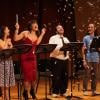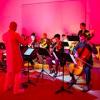
The terms “cross-cultural music” and “transcultural music” may seem interchangeable. But according to Los Angeles-based composer and conductor Derrick Skye, who uses the latter term to describe his compositions, there’s an important distinction to be made.
“Transcultural music is about integrating elements from musical traditions to create new forms of expression,” Skye said. “Cross-cultural music refers to crossing over. But if you’re crossing over, you’re leaving something behind. Transcultural music is more of a blending. It’s about making the tent bigger.”
It’s also about exuberance, connection, and joy — at least when filtered through Skye’s sensibility. His latest work, a Los Angeles Chamber Orchestra commission entitled To Be a Horizon, will be premiered by that ensemble April 20 and 21 in Glendale and at UCLA.
The third in a series of short orchestral pieces with the umbrella title Prisms, Cycles, Leaps, the new work “leans heavily on melodic styles of different cultures,” Skye, 41, said in an interview from his Los Angeles home. “I don’t quote any traditional songs. But it weaves in and out of various styles. It’s the equivalent of hearing a gospel choir sing something and then hearing a classical chorus sing something.”
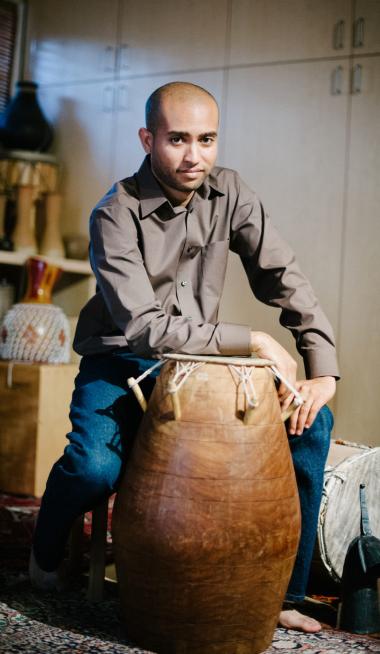
Skye’s complex, innovative, yet accessible music has been performed widely in recent years. Last summer, the BBC National Orchestra of Wales and conductor Ryan Bancroft premiered one of Skye’s pieces at the BBC Proms, one of classical music’s largest and most prestigious festivals. In his hometown, he has enjoyed the ongoing support of LACO, which also premiered the first two works in the Prisms series. Skye discussed his unique aesthetic with SF Classical Voice in an interview that has been edited slightly for clarity and concision.
Tell me about the title Prisms, Cycles, Leaps. Where did it come from, and what does it tell us?
I’ll take it one word at a time, starting with “prisms.” The prism is meant to symbolize a change in perspective. It can be a single object, a single theme, or a single concept. Your view of it changes as you look at it from different angles.
When you’re looking at something in multiple ways — as you hold the object and twist it this way and that — there’s a kind of repetition as you discover the patterns from different angles. That’s where the word “cycles” comes from.
The “leaps” part is when your changing perspective on the object or concept you were thinking about leads you to have an epiphany, and you leap to another object or concept and begin the process again.
Some of your leaps are pretty big ones — from one musical tradition to another, such as European classical music to Indian classical music and vice versa. What are you asking yourself as you write this music?
“How can you bring together as many voices as possible and weave them together with care, intention, and grace? Can it all work together harmoniously?” That’s what I find the greatest challenge is. It’s hard for us to do those things politically. The catharsis is I can figure it out in the music. If I can bring together people that way, hopefully politicians and other decision-makers can also find a way to embrace each other.
If someone attends a concert and hears one of my pieces and they’re familiar with Indian classical music, they’re going to recognize the specific classical Indian rhythmic form I’m using at a given moment. Someone familiar with West African music might recognize rhythms and forms familiar from their culture. You’re creating a personal connection between people from various parts of the world and what’s happening on the stage. [I’m telling them through the music,] “I see you. I hear you. I love you.”
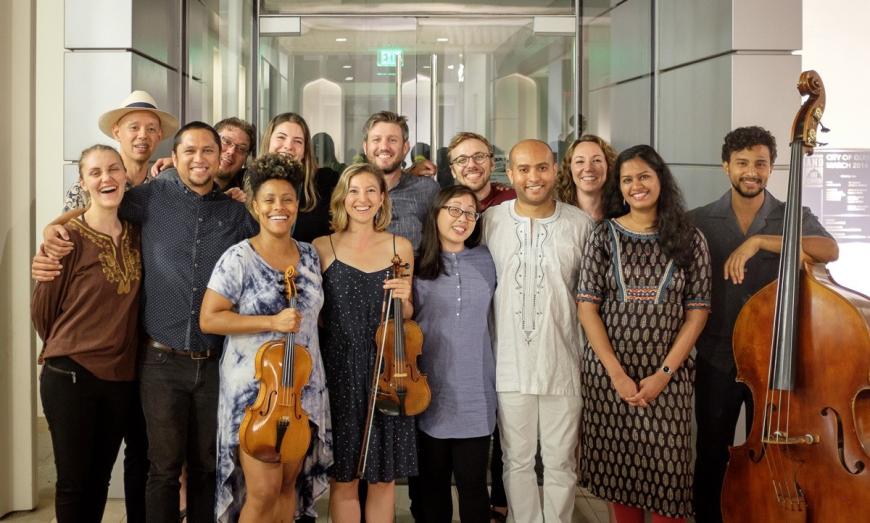
So you are creating a musical depiction of the U.S. as a land of immigrants.
Yes. Transcultural music is a uniquely American thing to do. Welcoming immigrants is our strength. It’s literally the American story. We should celebrate the fact we’re all here together. I’m not sure we know how to do that. But if we can, there’d be a lot less fear.
You use of a couple of techniques that are uncommon in classical music. One is rhythmic clapping.
In a lot of traditional music around the world, clapping is used to energize people in a profound way. I think people connect with it because there’s a connection between clapping and joy. Most of the time people are clapping their hands together, it’s in celebration of something. Often, I’ll use clapping in my music when I’m trying to evoke celebration of this transcultural musical moment.
In addition, your scores often call for audience participation. In general, how do audiences respond to such requests?
There’s no audience participation in this new piece. But there are some pieces where I have people clap or sing. [Their enthusiasm level] depends on the community. If you explain why you’re asking them to do this, there’s a better chance they’re happy to participate.
The room also plays a role — the space in which the piece is being performed. Most of the time, when classical music is being played, the architecture of the building is such that you’re in the audience and the musicians are onstage. This conveys the message that you’re there as an observer. I’ve noticed that when these pieces are performed outside or in a gallery, people tend to be more enthusiastic about participating.
As all that clapping suggests, your pieces are often quite fun. Is conveying joy part of your goal as a composer?
It is part of my aesthetic. We all have extremely busy, increasingly complex lives. The question I deal with is how to strike a balance between highly conceptual art music and music that’s more recognizable.
You’re trying to write music that’s intellectually stimulating but not so complex it’s off-putting.
Exactly. What I have found is when you’re able to balance those things, that’s when people have fun.
You list your own ancestry as Ghanaian, Nigerian, British, Irish, and Native American.
I didn’t know any of that until I did genetic testing — 23andMe. There’s a grandfather on my mom’s side I didn’t know. I’m almost 35 percent European — I had no idea! There’s a lack of records when it comes to enslavement. When you know where you come from, it can be really empowering.
Let’s talk about your immediate history. Are you a California native?
I was born in Santa Ana, in Orange County. But my family moved to Fresno, in the Central Valley. That’s where I did primary school. I’ve always had extended family in L.A., so we visited often. I went to school at UCLA and then California Institute of the Arts. I’ve been in Los Angeles ever since.
You told another interviewer that your earliest exposure to music was “in a religious context.” Does that mean you sang in a church choir?
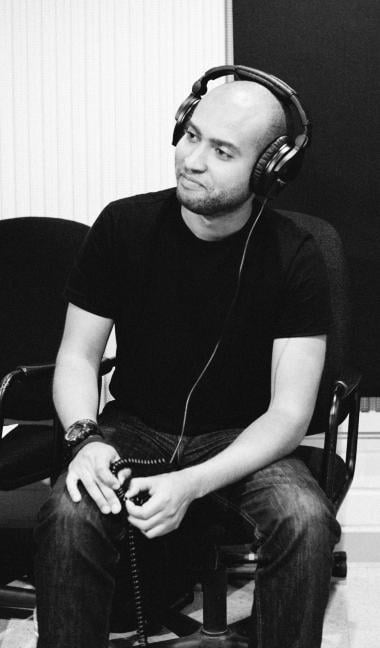
My dad played organ and piano in church. Seeing him work with the choir and band are my earliest memories of music. A lot of that music is based on oral tradition in performance. It’s not written down, or if so, it’s in a very simplified form. When I started composing music in school, the process was very unlike those earliest memories of how music is created. It was about sitting at the piano, poking it out, and then writing it down.
I’m left-handed, and whenever I wrote anything down, I would end up smudging it as I went left to right. So I had to figure out another way. The proliferation of computerized music-writing tools really helped me. They allowed me to record myself performing. Then I would take those recordings and do melodic dictation for the engraving part of it. That transformed my writing process profoundly.
It was much closer to how you learned about musical creation in the first place.
Exactly. You start from the performing aspect, and when you have it, you write it down.
How old were you when you started playing music?
I was 12 or 13. My first instrument was percussion, followed quickly by the trombone. The whole time I was playing those, I wasn’t interested in being a professional composer. I had my sights set on being an astronaut. To this day, I’m a huge fan of the cosmos, space, physics.
So how did you get sidetracked into music?
It’s an interesting story. I discovered that when you’re doing science, if you need some kind of device and you can’t buy or borrow one, you just have to make it yourself. I felt the same way about music. I was ferociously looking for transcultural music, but often the only place I could find music in that style was in film scores. I’d hear these snippets and think, “Why can’t there be a whole classical piece where you can entangle these two styles together?” So I started making it myself.
I did a lot of research about different cultural approaches to music and did a lot of listening. When I got to UCLA, they have a Western classical department and an ethnomusicology department. I went in as a music major. As I was studying Bach chorales and [Igor] Stravinsky and [Arnold] Schoenberg in the daytime, in the evening I took classes on West African music and dance and how to play the tabla. I sat in on the Bulgarian Women’s Choir and the Balkan Wedding Band.
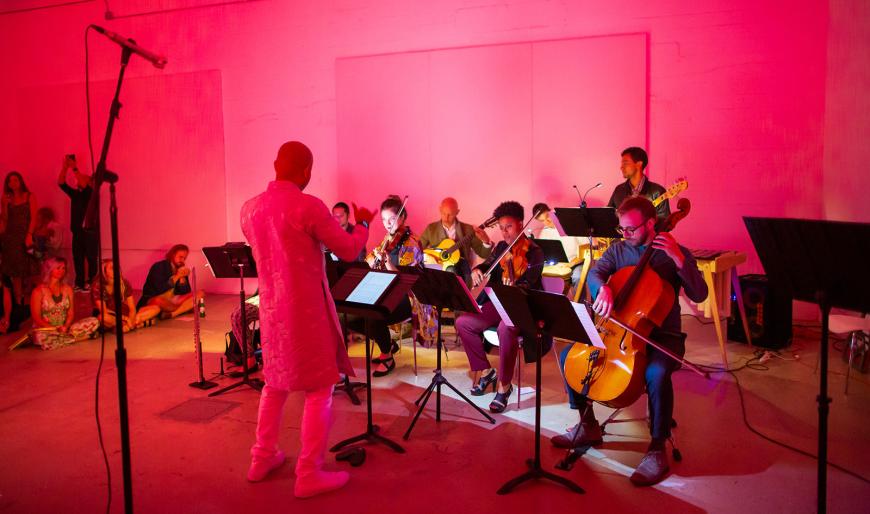
How supportive were your teachers at UCLA and at CalArts, where you did your graduate work?
Some really couldn’t understand what I was doing. I choose to cherish the ones who did.
What’s next for you?
Right now, I’m working on an opera commissioned by Lincoln Center — a wild electroacoustic thing. It has a lot to do with music and health. Then I’ve got a violin concerto and a double concerto for violin and cello. I am also writing something for the San Francisco Gay Men’s Chorus. I’m also super excited about a project I’m doing with the Knoxville Symphony: a West African drum concerto.
I also have conducting gigs where pop stars want me to conduct them with an orchestra. I was at Madison Square Garden with DJ Black Coffee last October. It was sold out — 20,000 people! That was wild.
I keep telling myself, “At some point I’m going to get back to becoming an astronaut.” But people started playing my stuff, and I’m still enjoying writing it. It’s so fulfilling. There always seems to be another thing that I want to try to bring together. So I keep doing it.


